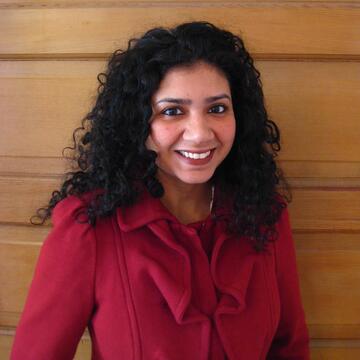
Aysha Hidayatullah
Associate Professor
Biography
Aysha Hidayatullah is Associate Professor in the Department of Theology and Religious Studies, and she teaches undergraduate courses on gender, sexuality, race, ethics, and religious studies in Islamic traditions. She is the 2025-26 NEH Chair in the Humanities at University of San Francisco, as well as a 2025-26 Visiting Scholar at the Abbasi Program in Islamic Studies at Stanford University. At Harvard Divinity School, she was a 2024-25 Research Associate at the Women's Studies in Religion Program and Visiting Associate Professor of Women's Studies and Islam. She began teaching at USF in 2008, after receiving her MA and PhD in Religious Studies from the University of California, Santa Barbara, and her BA in Women's Studies and English from Emory University.
Hidayatullah is the author of Feminist Edges of the Qur'an (Oxford University Press, 2014), a study of feminist exegesis of the Qur'an. Her forthcoming book, This Body Called Muslim, is a study of Islamic ritual practices in relation to the body. Her other publications and research interests span constructions of gender and sexuality in Islamic traditions; literary representations and self-representations of Muslims in relation to gender; constructive Muslim theology; and methodologies and epistemologies in the study of Islam. She was the founding co-chair of the Islam, Gender, Women program unit of the American Academy of Religion.
Research Areas
- Constructions of gender and sexuality in Islamic traditions
- The body in Islamic ritual practices
- Feminist exegesis of the Qur'an
Education
- PhD, Religious Studies, University of California, Santa Barbara, 2009
- MA, Religious Studies, University of California, Santa Barbara, 2005
- BA, Women's Studies and English, Emory University, 2001
Awards & Distinctions
-
2023, Collective Achievement Award (for co-developing “Moment to Movement” anti-racist pedagogy faculty workshop program), College of Arts & Sciences, University of San Francisco
-
2019, James Catiggay Changemaker Award, Interwoven Graduation Ceremony, University of San Francisco
- 2017, Distinguished Teaching Award, University of San Francisco & University of San Francisco Faculty Association
- 2016-2017, Dean's Scholar Award, College of Arts and Sciences, University of San Francisco
- 2015, Ignatian Service Award, University of San Francisco
Selected Publications
- Hidayatullah, A. "Structural Challenges in Constructive Muslim Thought on Gender and Sexuality." The Muslim World. Special Issue: The Work of Constructive Muslim Theology, ed. Martin Nguyen. Vol. 115, No. 1 (2025): pp. 5-7.
- Hidayatullah, A. "Introduction." Islam at Jesuit Colleges and Universities, eds. Hidayatullah, A., and Brigham, E., The _Lane Center Series, Vol. 4 (2016) pp. 7-10.
- Hidayatullah, A. (2015). Behind Every Good Muslim Man: Fictional Representations of ‘A’isha after 9/11. Muhammad and the Digital Age ed. Ruqayya Yasmine Khan (Chapter 6). Austin, TX: University of Texas Press pp. 129-157.
- Hidayatullah, A. (2014). Feminist Edges of the Qur'an. New York: Oxford University Press.
-
Hidayatullah, A., Zaman, T. (2013). 'Speaking for Ourselves': American Muslim Women's Confessional Writings and the Problem of Alterity. Journal for Islamic Studies, Vol. 33 pp. 48-76.
- Hidayatullah, A. (2014) Research Guide to "Gender and Sexuality," Oxford Bibliographies Online: Islamic Studies
- Hidayatullah, A. (2014). Feminist Interpretation of the Qur’an in a Comparative Feminist Setting, Journal of Feminist Studies in Religion Vol. 30, (No. 2), pp. 115-129.
- Hidayatullah, A., and Plaskow, J. (2011). Beyond Sarah and Hagar: Jewish and Muslim Reflections on Feminist Theology. Muslims and Jews in America: Commonalities, Contentions, and Complexities, eds. Reza Aslan and Aaron Hahn Tapper, Palgrave Macmillan, pp. 159-172.
- Hidayatullah, A. (2011). Muslim Feminist Birthdays. Journal of Feminist Studies in Religion Vol. 27 (No. 1), pp. 119-122.
- Hidayatullah, A. (2010). Mariyya the Copt: Gender, Sex and Heritage in the Legacy of Muhammad's umm walad. Islam and Christian-Muslim Relations Vol. 21, (No. 3) pp. 221-243.